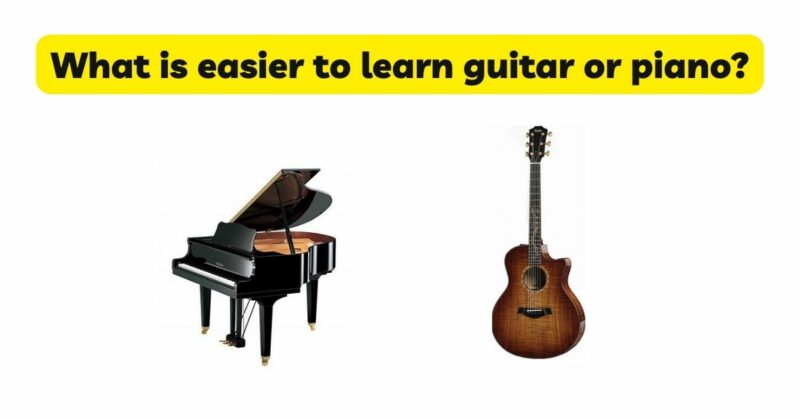Embarking on a musical journey by learning an instrument is a rewarding and enriching experience. For beginners, choosing between learning guitar or piano can be a challenging decision. Each instrument has its unique characteristics, challenges, and learning curves. In this article, we will delve into the factors that may influence the ease of learning guitar and piano, considering aspects such as initial difficulty, physical coordination, music theory, available learning resources, and personal preferences. By understanding these factors, we can shed light on the question of which instrument may be easier for aspiring musicians to learn.
- Initial Difficulty and Physical Coordination: When starting to learn an instrument, beginners often encounter challenges related to physical coordination and finger dexterity. In this regard, piano may have a steeper initial learning curve. Piano requires both hands to work independently, coordinating various finger movements and hand positions simultaneously. Guitar, on the other hand, involves finger placement on the fretboard and strumming or picking with the other hand. While the guitar may seem simpler in terms of physical coordination, mastering specific techniques and developing finger strength can take time and practice.
- Music Theory and Notation: Understanding music theory and notation is an essential aspect of learning any instrument. In this regard, the piano may offer a more straightforward approach. The piano’s visual layout, with its linear representation of notes, facilitates the understanding of concepts such as scales, intervals, and chord progressions. Guitar, on the other hand, requires learning to read chord diagrams, tablature, and potentially sheet music notation. While these aspects may take some time to grasp, resources such as chord charts and online tutorials can assist beginners in their guitar learning journey.
- Learning Resources and Accessibility: The availability and accessibility of learning resources can greatly impact the ease of learning an instrument. In this digital age, both guitar and piano learners benefit from numerous online tutorials, video lessons, interactive apps, and communities dedicated to music education. However, due to its popularity and ubiquity, guitar learning resources may be more abundant and readily available compared to those for the piano. This accessibility can make the learning process smoother and more enjoyable for aspiring guitarists.
- Versatility and Musical Styles: The versatility of an instrument, along with the variety of musical styles it can accommodate, can influence the ease of learning. The guitar is renowned for its adaptability across various genres, including rock, folk, pop, and blues. This versatility allows beginners to explore their preferred musical styles and develop foundational skills while playing familiar songs. The piano, although widely used in classical and jazz genres, is also suitable for contemporary music. However, due to the piano’s traditional associations, beginners may initially perceive it as more challenging to learn for non-classical styles.
- Instrument Size and Portability: Considering the physical characteristics of the instrument can also play a role in determining ease of learning. The piano, especially acoustic pianos, is larger and less portable compared to guitars. This aspect can pose practical challenges for beginners who have limited space or need the flexibility to carry their instrument to lessons or practice sessions. Guitars, especially acoustic and smaller-bodied models, offer greater portability and convenience in terms of practicing in different settings.
- Personal Preference and Motivation: Personal preference and motivation are crucial factors in the ease of learning an instrument. An individual’s affinity for a particular sound or musical style can greatly influence their dedication and perseverance in the learning process. While one person may find the piano more intuitive and enjoyable to learn, another may connect more with the guitar’s sound and playing techniques. Ultimately, choosing an instrument that aligns with personal preferences and musical goals can make the learning experience more enjoyable and potentially easier.
- Instructional Approach and Teaching Methods: The instructional approach and teaching methods used for each instrument can also impact the ease of learning. The piano often follows a structured curriculum, emphasizing fundamental techniques, sight-reading, and theory. This structured approach can provide beginners with a clear learning path and sequential progression. Conversely, guitar instruction may be more flexible, allowing learners to focus on chords, strumming patterns, and playing songs early on. This informal approach can create a sense of achievement and motivation for beginners.
- Continuing Learning and Progression: The ease of learning an instrument also extends to the journey beyond the initial stages. While the guitar may offer a relatively quick start in terms of playing basic chords and songs, progressing to more advanced techniques and mastery requires continued dedication and practice. The piano, with its comprehensive range and polyphonic capabilities, offers a lifelong learning experience with various challenges at different skill levels. As learners advance, both instruments present increasing complexities that require continued effort and commitment.
Conclusion: The question of whether guitar or piano is easier to learn lacks a definitive answer as it depends on various factors. While the piano may have a steeper initial learning curve due to finger coordination and music theory, the guitar offers flexibility, abundant learning resources, and an approachable learning path. Ultimately, the ease of learning an instrument is influenced by personal preferences, motivation, available resources, instructional methods, and dedication to practice. It is advisable to choose an instrument that resonates with one’s musical interests, aligns with personal goals, and sparks enthusiasm. Regardless of the instrument chosen, the journey of learning and mastering music is a rewarding and transformative experience that can bring joy and fulfillment for a lifetime.


